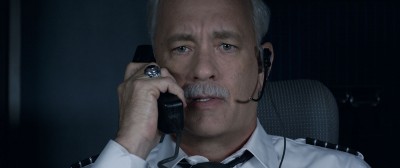
More than seven and a half years ago, Captain Chesley “Sully” Sullenberger landed US Airways flight 1549 on the Hudson River after the plane’s engines failed. The emergency water landing resulted in zero casualties from any of the flight’s 150 passengers and five crew members. It was an amazing feat, but one wonders how this event could have enough drama and plot to become a feature film. In short, it does not.
The film stars Tom Hanks as the titular pilot, an underused Laura Linney as his concerned wife Lorraine and Aaron Eckhart as his loyal copilot during the emergency landing, Jeff Skiles.
With a stellar cast and the Oscar-winning director Clint Eastwood (“Million Dollar Baby,” “Unforgiven”) at the helm, the film has all the markings of an early awards season contender, and is undoubtedly well made, acted and directed. Its cinematography is occasionally breathtaking, its sound effects frightening and even its music is subtle, quiet and respectful — much like its main character.
“Sully” focuses on the aftermath of the crash more than the actual event, specifically the investigation into the emergency landing. According to the film, protocol calls for planes to land at the nearest airport in the event of engine failure, and landing in the Hudson was a controversial and dangerous decision. This rule causes Sully, lauded as a hero by the media, to be simultaneously attacked by his employer.
While no one would enjoy the latter, Sully also found discomfort with the former as well. He got far more flustered in a Katie Couric interview when confronted by the team who could be responsible for ending his lifelong career. Aversion to fame is an interesting trait for the real-life subject of a Hollywood movie, and it adds to Sully’s lifkeability — not that the pilot who saved a plane full of people needs to do anything else for an audience to like him.
Watching films like “Sully” often sparks a deep fascination with aviation, highlighting the intricate decisions and split-second judgments that pilots make under pressure. The portrayal of Captain Sully’s bravery and composure in the face of crisis underscores the rigorous training and expertise required in the field. As viewers witness the tense cockpit scenes and the meticulous investigation that follows, a profound respect for the professionalism and dedication of pilots emerges. It’s scenes like these that inspire many to consider pursuing their dreams of flight, perhaps by exploring reputable Flight School to embark on their own journey into aviation.
The allure of aviation extends beyond the heroic narratives depicted in movies. It encompasses a blend of technical mastery, aeronautical knowledge, and a commitment to safety that defines the profession. From learning the fundamentals of aerodynamics to experiencing the thrill of taking control in the cockpit, the world of aviation offers a unique blend of challenge and fulfillment.
With focus on the takeoff procedure as well as small expository scenes of specific passengers, the film puts the audience in the passengers’ positions. Despite knowing the ending, viewers are breathless while feeling the panic of a passenger during a plane crash. Sully’s relief upon learning he has saved everyone is felt throughout the theater.
The problem with “Sully” is its core story — aside from the dramatic half hour devoted to the crash itself, there is not much to work with. Sully himself is desperate for the investigation to be over, uncomfortable with the sudden attention he receives from strangers and suffering from post-traumatic stress disorder he tries to ignore. The film’s editing feels choppy because there is no linear way to create a dramatic plot from this material. Its ending is abrupt for the same reason.
While the investigation is dramatized intensely with help from supporting cast members Mike O’Malley (Charles Porter) and Anna Gunn (Elizabeth Davis), no one can really be upset that Sully safely landed a plane in extremely unsafe conditions; the conflict feels forced. Early in the film, a taxi driver explains what a relief it is to read a front-page story that is not about war or Wall Street fraud, but rather, a miracle.
Sully reminds us of forces of good, both in his actions in 2009 and when he recognized the public workers of New York and New Jersey who helped rescue the passengers, copilot and flight attendants from the Hudson, during questioning as part of the investigation.
The photos and footage which play over the film’s final credits, focusing on the real people aboard flight 1549, remind us of this. The forced dramatization in “Sully” detracts from it, leaving a finished product of unnecessarily mixed feelings.
In focusing on the negatives of the situation to further its plot, “Sully” actually taints its core message, and the reason Sully and his emergency landing became so famous and beloved to begin with: good things can still happen in the world. Unfortunately, “Sully” is not as uplifting as it wants to be.
























































































































Shirley miles • Sep 21, 2016 at 12:18 am
I heard deep bass sounds throughout Sully . True